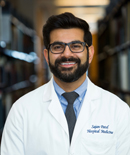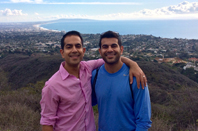Interview with Saj Patel
A Conversation with Sajan Patel, Assistant Clinical Professor
Where were you born and raised? Tell me about your family and where you fit into the hierarchy.
 I was born in Chicago and, when I was five, we moved to North Carolina and then to Orange County where I grew up. My parents are both from India and did their medical residencies in Chicago; Dad is a pulmonologist and Mom is an oncologist. I wasn't planning to go into Medicine (I was thinking about Psychology), but when I took a few pre-med classes in college, it clicked that I liked it. We joke that my older brother chose the other route that us Indian kids are allowed: he is an engineer. I was a rebellious child and for a time in high school, my parents weren't so sure of my future. I got into little scrapes of trouble, juvenile things like toilet papering or trespassing, I procrastinated in getting homework done, dated early, and went to parties. My brother, on the other hand, was high school valedictorian, got free ride to Berkeley, earned his degree Mechanical Engineering and received the University Medal for Engineering. Being his younger brother, expectations for me were high so, when teachers asked if he was my brother, I said that he was my cousin.
I was born in Chicago and, when I was five, we moved to North Carolina and then to Orange County where I grew up. My parents are both from India and did their medical residencies in Chicago; Dad is a pulmonologist and Mom is an oncologist. I wasn't planning to go into Medicine (I was thinking about Psychology), but when I took a few pre-med classes in college, it clicked that I liked it. We joke that my older brother chose the other route that us Indian kids are allowed: he is an engineer. I was a rebellious child and for a time in high school, my parents weren't so sure of my future. I got into little scrapes of trouble, juvenile things like toilet papering or trespassing, I procrastinated in getting homework done, dated early, and went to parties. My brother, on the other hand, was high school valedictorian, got free ride to Berkeley, earned his degree Mechanical Engineering and received the University Medal for Engineering. Being his younger brother, expectations for me were high so, when teachers asked if he was my brother, I said that he was my cousin.
Who in your life has influenced you, either personally or professionally? What characteristics do you try to emulate?
 My brother. We grew up fighting and had lots of rivalry. He was the good kid with the good grades. We were polar opposites and I didn't want to be compared with him. When he went off to college, I realized that I had this cool older brother who always had his head on his shoulder, was even-keeled, reserved, and mature beyond his years and we began to stay in touch. He became my advocate and I began to appreciate and embrace our differences. He keeps me grounded and I take him out of his comfort zone. I learn much from him about being thoughtful, mindful, and methodical. While I am more emotional, he is rational and is the mediator of our family, the one who can see both sides of an issue and objectively bring both sides closer together. His demeanor, so different than mine, is what I aspire to. Whenever I have had a hard decision, he is who I turn to and who I aspire to be more like. In addition to his Mechanical Engineering degree, he is working on a PhD at Stanford and, just for fun, is working on a masters degree in Economics.
My brother. We grew up fighting and had lots of rivalry. He was the good kid with the good grades. We were polar opposites and I didn't want to be compared with him. When he went off to college, I realized that I had this cool older brother who always had his head on his shoulder, was even-keeled, reserved, and mature beyond his years and we began to stay in touch. He became my advocate and I began to appreciate and embrace our differences. He keeps me grounded and I take him out of his comfort zone. I learn much from him about being thoughtful, mindful, and methodical. While I am more emotional, he is rational and is the mediator of our family, the one who can see both sides of an issue and objectively bring both sides closer together. His demeanor, so different than mine, is what I aspire to. Whenever I have had a hard decision, he is who I turn to and who I aspire to be more like. In addition to his Mechanical Engineering degree, he is working on a PhD at Stanford and, just for fun, is working on a masters degree in Economics.
In your time at UCSF, you seem to have been uber-energized by purpose. What was the match to the flame?
Part of what has guided me and made my career so far be so rewarding, even more than academic interest or prestige, was fit. Coming to UCSF as a fellow was somewhat intimidating: Bob, of course, and being surrounded by these giants that we saw at SHM. Here, it feels level, people are engaged and the fellows never felt like we were at the bottom of the ladder. This environment felt like a special place where I don't have to be quiet; there is support and sociality. I was lucky enough to get involved early on with projects that have high visibility and getting to work with amazing mentors like Alvin, Sumant, Michelle, and James, was empowering. Being involved at an early stage, I had some momentum transitioning from fellow to faculty. I love being where my work is valued and there is so much that is interesting and fun. I get excited and overly enthusiastic, and I love being engaged and the whole vibe of the division.
Are you adventurous and what is a physical challenge that you surprised yourself by doing?
I would say that I am adventurous and a thrill-seeker. I love to travel and, if there is some adrenaline-pumping activity, I will do it: bungee jumping, skydiving, and I've cage-dived with great whites in South Africa, which was incredible. You are put into a cage for a few minutes, just deep enough to hold your breath, and the waters are churned so that the sharks come crashing at the cage. Your heart is pounding and all you see lots of teeth!
How did you survive the onslaught of election coverage? And have you developed a personal philosophy about going forward?
In this era, when everyone is connected to Facebook, on smart phones, and getting news alerts and push notifications, it is so easy to get news overload. I limited my exposure to when I was commuting on the train or maybe an hour at home. I read the most relevant news articles and engaged with people who I thought were having meaningful discussions and tried to be mindful about how much time I spent on what was the time-sink that was election coverage. Moving forward after the election, and its unexpected result, I tried to reflect on what led up to it: what side of America did we not see, what did we underestimate, who was not represented, and who felt disenfranchised by our current system. I think this election and its outcome opened people's eyes to problems that may have always existed, and now is an important time to reflect and introspect on how we can address these problems. Business as usual wasn't working and if this hadn't happened, I am not sure that people would be asking questions or reflecting about America, politics, or their parties. It's a good time to figure out where we are as a country and how we can move forward.
You seem to be an easygoing guy, but everyone has limits. What are yours and how do you react when boundaries have been exceeded?
I have a low threshold for people who are unkind, mean, or rude, professionally or otherwise. Even if a patient is rude to staff, I will be forward about it. It is a delicate balance, given our efforts toward patient satisfaction, and I do establish the expectation to my teams that we should have positive interactions and, if there is a negative interaction, I will act as an advocate. Although I sometimes will jump to conclusions or react quickly, and this is something I've learned from my brother, I've learned to take a step back and try to figure out what is going on beneath the surface, what is the underlying reason that we just haven't understood?
What was the most creative apology you've ever had to express?
As kids, a cousin and I got an older cousin into trouble for breaking something that we had. He got into a lot of trouble and we felt pretty bad because we didn't realize how much trouble we'd caused until it was too late. So we wrote and performed a song and dance routine to apologize to him.
Tomorrow is the last day on Earth but you have time for one fantastic last meal. What would it be?
There is a tiny Vietnamese place in Nob Hill called Cordon Bleu that was one of the first places I went when I moved here. Its reviews were basically, "it's cheap and it's good." It has a very small menu, everything is under $10 and it is cash only. The owner cooks your meal on the grill right in front of you. My favorite is the #5. You can bring your own beer or wine and the food is amazing—their imperial rolls are super fried and delicious. Whenever visitors come from out of town, that's where I take them. Since it was the first place I went to in San Francisco, it holds a lot of sentimental value for me.
Do you have a favorite saying from the movies?
Yes, from Vanilla Sky with Tom Cruise: "the sweet ain't as sweet without the sour." You definitely have to have bad times and bad things to appreciate the good.
What song might be the soundtrack of your life?
There's a song that came out when I was in seventh grade that was the first song I ever memorized all the lyrics to: "Semi-Charmed Life" by Third Eye Blind. I thought it was a feel-good song about enjoying life but had no idea what the lyrics were actually about until much later in life!
What might your mother say makes you, you?
She says that I am fun-loving and have an infectious energy, and I hope I do. She is gregarious, outgoing and social, while my dad and brother are more reserved, so we complement each other.
Thank you, Saj!
- by Oralia Schatzman
View Saj's professional bio | See previous faculty interviews
